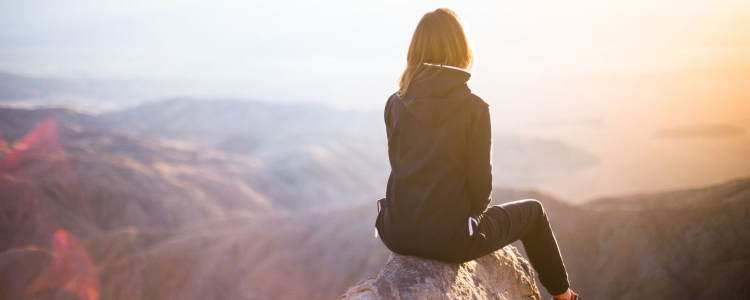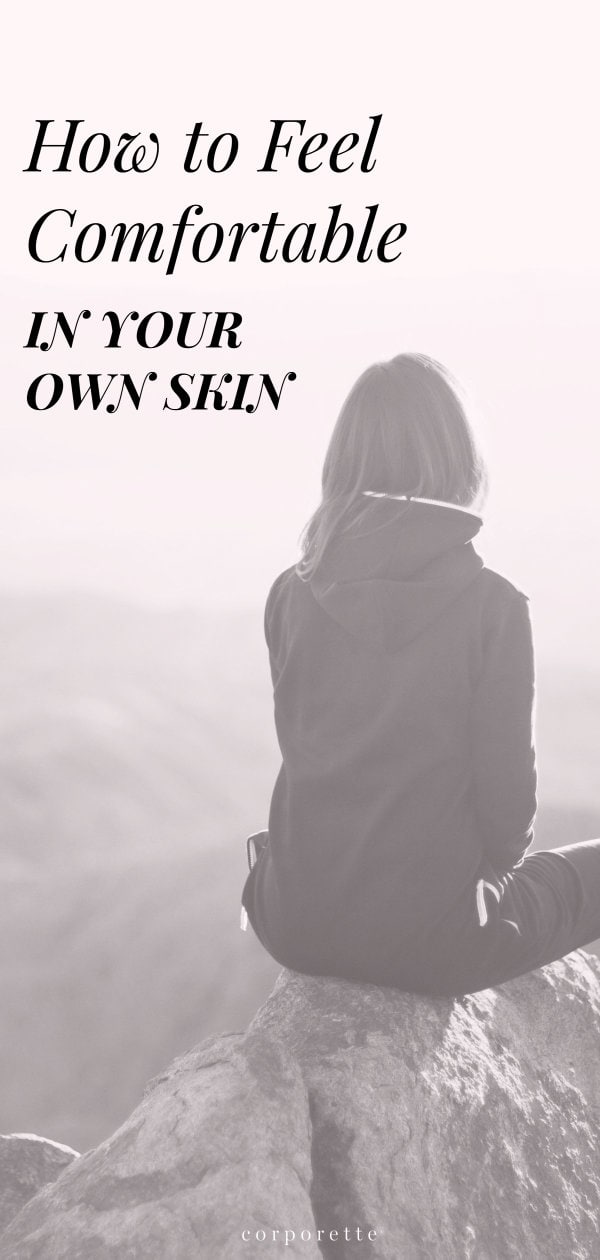How to Feel Comfortable In Your Own Skin: Readers’ Advice
This post may contain affiliate links and Corporette® may earn commissions for purchases made through links in this post. As an Amazon Associate, I earn from qualifying purchases.

Today we're talking about how to feel comfortable in your own skin, inspired by a reader comment. A few months ago, a reader asked a question in the comments about her negative body image and how she doesn't feel comfortable in her own skin. She asked if there are options other than therapy that could help her address the issue. Readers gave her a lot of great advice on body neutrality and other ideas, so we thought we'd round it up today.
We'd love to hear your thoughts, too: How do you feel about your body? Have your feelings changed as you've gotten older? What are your tips for a more positive (or neutral) body image?
First, here are some stats about body image:
- In a 2011 Glamour survey, 97% of women reported at least one “I hate my body” moment during the 24 hours they tracked their thoughts. [Glamour]
- In a 2021 study, 76% of U.S. adults said that the media promotes an unattainable body image for women. [YouGovAmerica]
- Only 11% of U.S. women aged 45 and older are satisfied with the appearance of their body. [Medical News Today]
- 43.7% of women over 60 report considering cosmetic surgery. [NOW] (See this guest post about a reader's positive experience with rhinoplasty.)
- Researchers analyzed 250 studies performed between 1981 and 2012 and found that women’s body dissatisfaction fell by an average of 3.3 points. [The Cut]
Reader Advice on How To Feel Comfortable In Your Own Skin
Know that the BMI chart is not a helpful tool.
For millions of people in the U.S., BMI does not correlate to health. One problem is that BMI doesn't distinguish between body fat and muscle mass — but muscle is denser than fat. Also, the classifications (“overweight,” etc.) are mostly based on Caucasian body types. This NPR article explains additional drawbacks of BMI. (A note for parents: The growth charts used by pediatricians also aren't as useful as you might think, as explained in this NYT article.)
Learn about body neutrality and Health at Any Size.
Here's how this Healthline article explains body neutrality: “This movement acknowledges that you may not love your body day in and day out while emphasizing that this is absolutely OK. You can accept your body as it is, even when you don’t exactly love it.” For many people, it's a helpful alternative to body positivity. This Well+Good article explains that HAES is a “a social justice framework that respects the diversity of body shapes and sizes, supports inclusive health care, and rejects weight discrimination and stigma against larger bodies.”
Also, check out the #bodyneutrality hashtag on Instagram and TikTok.
{related: body image as a mom}
Follow “midsize” fashion accounts on Instagram.
A reader recommended wardrobe_oxygen, alexlight_ldn, victoriagarrick, karsoncamielle, and katiesturino, who recreates celebrity outfits in XL sizes. This 2021 Harper's Bazaar article recommends 20 plus-size and midsize fashion content creators to follow, and this 2019 Hello Giggles piece lists 18 plus-size women of color to follow on Instagram. (It may also be helpful to browse r/instagramreality on Reddit to see how many influencers alter their bodies, sometimes drastically, in their social media photos.)
{related: 4 fashion stores that use real women as models}
Don't feel guilty for being unhappy with your body.
Try not to see your negative perspective as a personal failure. Feel those feelings and then move on, perhaps to a fitness goal you can work toward. One reader's examples were running a mile in a certain time, or running a particular distance, or doing a certain number of pull-ups. Also, recognize that it's tough to escape the influence of the many aspects of society that can contribute to a negative body image, including social media.
Love your body as an action, not a feeling.
The reader who shared this excellent strategy specifically recommended exercise, healthy and delicious food, a massage, and a luxurious bath now and then.
(related: the best strength training workouts to do at home}
Try to ignore size numbers on clothing.
Concentrate on how something fits rather than the size you “should” be. One reader shared a “silly” tactic that works for her — buying clothing in non-U.S. sizes. (Don't forget that women's sizing makes no sense! Grrr.)
Recognize that you're not the only the person who has trouble finding clothes that fit.
One reader shared that she has to have all of her dress pants, pencil skirts, and sheath dresses tailored. Tailoring your clothes to fit better can go a long way toward making you feel more positive about how you look. (We've talked about suiting alterations, general alterations, and custom workwear in the past, as well as sewing patterns for workwear.)
Focus on how to feel better about yourself in ways that don't involve losing weight.
A reader shared that she puts her energy into her skin, hair, and so on.
{related: feeling “too fat” to interview (reader-submitted question)}
If nothing you've done has helped (or you're simply ready for outside help), consider therapy.
Yes, unfortunately, therapists are in short supply right now, but try searching Psychology Today's Find a Therapist feature by choosing the filters “eating disorders” or “weight loss” or perhaps “women's issues.” If you don't feel that you have an eating disorder, using that filter may find you the right therapist anyway.
But if you do suspect you have an eating disorder and need help, you can chat, call, or text the National Eating Disorders helpline. If you're in crisis, text “NEDA” to 741741 to be connected with a trained volunteer at their Crisis Text Line.
{related: the best websites and apps for online therapy}
Find bras that fit correctly.
(This is my own suggestion.) Bras that fits well can make a big difference in how you look in clothes — and they'll feel more comfortable, too! See our post on how to buy a bra that fits. Also, checking out Reddit's r/ABraThatFits is a must if you need sizing help.
Consider Amazon's Prime Try Before You Buy (my review from 2018, when it was called Amazon Prime Wardrobe, is here) to try on a bunch of bras at once without paying up front. They offer a seven-day free try-on. Note that ThirdLove (my review is here) offers half sizes (although Bare Necessities says that half sizes “don't exist”) and has a great return policy.
Readers, what are your thoughts — what are your best tips on how to feel comfortable in your own skin? Have you gone through a learning/readjustment process here as well?
Further Reading and Resources
- NEDA: National Eating Disorders Association
- HAES: Health at Any Size
- 4th Trimester Bodies Project (NSFW): “a documentary and movement dedicated to educating, embracing and empowering humans through photographs and storytelling”
- Books: Ditch the Diet: The 7 Essential Habits You Need to Get Lean, Stay Healthy, and Generally Kick Ass at Life and Intuitive Eating: A Revolutionary Anti-Diet Approach (affiliate links)
- “Body Positivity Doesn’t Mean What You Think It Does” [Refinery29]
- “What Is Body Neutrality, Exactly?” [Shape]
- “Diet culture is everywhere. Here's how to fight it” [NPR]
- “Breaking Down the ‘Wellness-Industrial Complex,’ an Episode at a Time” (about the podcast Maintenance Phase) [NYT]
- “We surveyed over 4,250 people on body image, weight and dieting — and the results are surprising” [Good Housekeeping]
- “Gender Dysphoria Symptoms: Here's How to Know if You Have It” [Health]
Stock photo via Stencil.
This post contains affiliate links and Corporette® may earn commissions for purchases made through links in this post. For more details see here. Thank you so much for your support!


Just popping in to say how much I love Maintenance Phase. Well worth a listen.
Yes, yes, yes! A favorite of mine.
Also wanted to say, recently heard something that landed with me – thinking of your body as an instrument, not an ornament. Or, the ‘mantra’ version, “My body is an instrument, not an ornament.” (This was from Drs. Lindsay and Lexie Kite.)
It’s really helpful for me to think about what my body does for me and how I use it in order to appreciate it more. My body does so much for me no matter what it looks like. It will continue to be my instrument to live my life for (hopefully) many years to come.
Feeling bad about your body is at once incredibly common and deeply weird. This is NOT a judgement on any woman who feels bad about her body; it’s a statement of what should be.
That influences everything from who I spend time with to what media I consume. Like women who don’t understand how pervasive alcohol is until they do a dry January, a lot of people probably have no idea how insidious this is.
Back in the day, when I was going and quite thin, I dated men who were very looks focused. Even if mine “measured up ” I still felt lousy about myself because it’s a really depressing measuring stick. Some picked apart my appearance, which taught me to DTMFA and to keep people like that out of my life. My friends don’t do diet talk. I do not spend time with people who pick apart my body, even if it’s “family” and “well intentioned.”
My TV watching is Pioneer Woman, Beat Bobby Flay, and the like. My Instagram has animals and marathoners. I try to remember on a regular basis that getting women to feel bad about their bodies is insanely lucrative. It’s 27 pairs of jeans, searching for the perfect ones. It’s endless creams and lotions and blowouts and haircuts. It’s liposuction, fillers, boob jobs, and Mommy Makeovers. It’s expensive gym memberships, diet plans, cookbooks, and calorie counting apps. (NO shade on women who do those things – shade is thrown at those who act like it’s the standard for existing in the world as a woman.)
It is really amazing how much healthier my mind is without that tsunami of body hate.
I recently changed how I feel about my body by taking up a new physical hobby/sport. I started distance running (which for me is very weird/crazy, and like pretty short ‘distances’!) but after six weeks I realized I was focused more on strength and drinking water to make sure my body was strong enough to run. It was a weird side effect!
Yes! I took up weightlifting a year ago, and seeing all the strength that I have gained in that time made me appreciate what my body does for me. Similar to your point on keeping your body strong, most of my dialogue about my body is about how to take care of it (e.g. I need to eat a real dinner before the gym, or I won’t be able to perform well in this workout. I have to go to bed earlier tonight to recover.)
My goals with exercise now all about performance, not about chasing thinness. I weigh within 5 lbs. of when I started, but my relationship with my body is night and day.
LOVE this post so much. One of my favorites of yours this year. HAES has helped me so much over the past three years. There’s lots of body image accounts on IG that are worth checking out. Tiffany Roe is my favorite of those :)